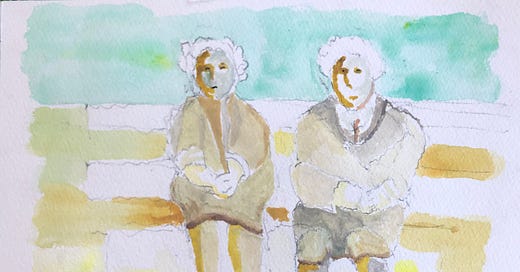Unaffordable drug prices and kickbacks from Big Pharma.
Justice Department sues Regeneron over payments to copay-assistance charity.
In my last newsletter I wrote about the current debate in Congress over allowing Medicare to negotiate drug prices.
As of now they can’t.
My doc keeps me on a few relatively inexpensive drugs to control my blood pressure. In exchange I must listen to his lectures on exercise and weight control.
Compared to some my age, my drug costs are low.
I have Medicare and Medicare Advantage. I pay the co-pay for the meds. But the co-pay is a percentage of the cost listed by the pharmaceutical company. That’s not what my insurance company pays to the pharmaceutical company, which is less than the list price.
As I wrote in the last newsletter, for some people on Medicare this can eat up half of their Social Security benefit.
Consumers in the United States pay the highest drug prices in the industrial world.
An old high school friend wrote me.
I total agree with what you said, but I wanted you to know that almost every drug manufacturing company will have a “patient assistance program” of some sort. The ones that know they have a very expensive drug will allow Medicare recipients to sign up. Each company is different, but someone whose annual income is less than 2 times the Federal Poverty Level will qualify with the majority. (Federal Poverty Level in 2021 is $1094/month single or $1472/month couple.) All you have to do is contact the company and find out what they need to know. The patient’s physician then sends the prescription to the company and they either send the medication to the patient, the physician or a designated pharmacy to get to the patient.
Also, Medicare has a program called “extra help” or Low Income Subsidy, LIS. Someone whose income is less than $1630/month single or $2198/month couple and has assets less than $14,790 single or $29,520 couple can qualify. Primary home and car do not count as assets. In this program, there is no or reduced deductible, and copays are reduced. The premium is subsidized up to “benchmark” plans (about $33/month). Does not help much with very expensive drugs, but reduces the “donut hole” coverage from 25% to 15%. Still have the 5% charge after going through the “donut hole.”
You may want to add to your blog information about both plans.
I wrote back and said that I agree that this information is important and I would share it.
I want to share a warning.
Some of these patient assistance organizations are nothing more than fronts for Big Pharma.
On December 17, 2020, The Boston Herald reported on charges of improper conduct taking place at Chronic Disease Fund Inc. in an article titled, "Biogen pays $22 million to resolve drug kickback accusations."
Chronic Disease Fund (known as Good Days) is a patient assistance charity.
You can read The Boston Herald article.
In a similar story, The New York Times reported that the drugmaker Regeneron funneled tens of millions of dollars to a charity that paid the out-of-pocket costs for patients who took the company’s expensive drug.
Then Regeneron lied to internal auditors about it, according to a lawsuit filed by federal prosecutors in Massachusetts.
Here is how the patient assistance kickback scam works.
Federal anti-kickback laws prohibit companies from giving dollars directly to Medicare and Medicaid patients because the practice is considered a kickback.
So the drug companies have created a work-around by donating to nonprofit charities, which then give the money to Medicare patients. The arrangements are legal as long as there is no direct coordination.
Say there are two medications or treatments that are both equally effective. One is less expensive than the other. The company that produces the more expensive drug funnels dollars to the patient assistance charity for their expensive medication. But this means Medicare will also pay the higher price.
Apparently Regeneron got sloppy. The Chronic Disease Fund sent the company detailed projections for how many patients would need help paying for its medication and provided specific financial requests to cover that amount.
“Kickback schemes can undermine our health care system, compromise medical decisions, and waste taxpayer dollars,” said Phillip Coyne of Boston’s Department of Health and Human Services.





Kickback is the name of the game. This is an example of one drug and one politician and one billionaire.
"Citadel, a Chicago-based hedge fund, has $15.9 million in shares of Regeneron Pharmaceutical Inc., according to filings with the U.S. Securities and Exchange Commission. Citadel CEO Ken Griffin has donated $10.75 million to a political committee that supports [Florida Governor] DeSantis — $5.75 million in 2018 and $5 million last April."
https://apnews.com/article/joe-biden-business-health-coronavirus-pandemic-4d0d18b24e0dd41de2424e19b3ed994f